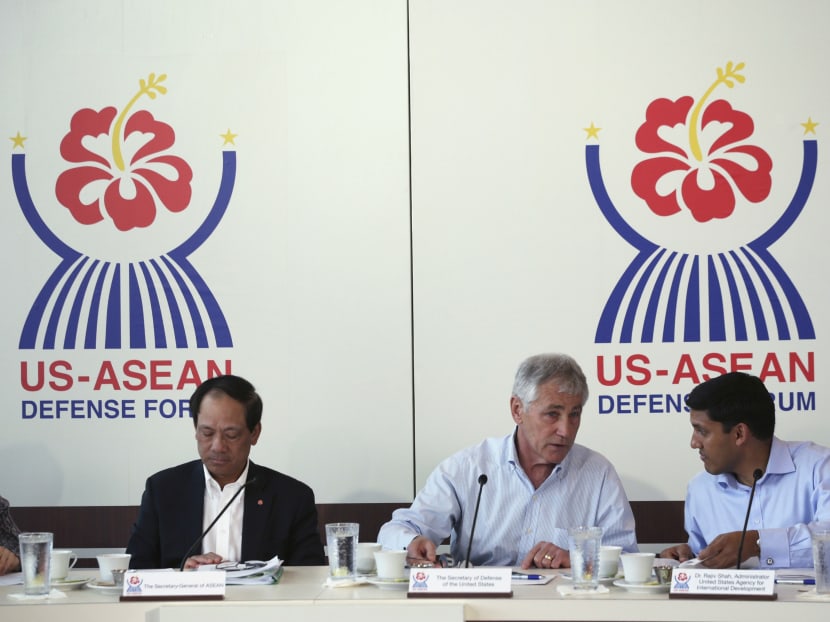Singapore offers Changi facility as ASEAN disaster response centre
HONOLULU — The Republic has offered its Association of Southeast Asian Nations (ASEAN) partners the use of its command and control centre in Changi to help coordinate responses to natural disasters, given the number of catastrophic events in the region over the past decade or so.

US Secretary of Defense Chuck Hagel (centre) talks to USAID Adminstrator Rajiv Shah next to Secretary General of ASEAN Secretariat Le Luong Minh (L) during a minister roundtable at the ASEAN Defense Forum in Honolulu, Hawaii April 2, 2014. Photo: Reuters
HONOLULU — The Republic has offered its Association of Southeast Asian Nations (ASEAN) partners the use of its command and control centre in Changi to help coordinate responses to natural disasters, given the number of catastrophic events in the region over the past decade or so.
The offer, which was made yesterday at an informal ASEAN-United States Defence Ministers’ meeting, received support from the various countries, Singapore’s Ministry of Defence (MINDEF) said in a statement.
MINDEF also said the ministers noted that a regional humanitarian assistance and disaster relief coordination centre, modelled after the Information Fusion Centre (IFC) in the Changi facility, would allow the militaries to respond speedily and effectively to a disaster.
The three-day meeting ended yesterday. On the first day, US officials had offered to help ASEAN countries prepare for the devastating effects of climate change, urging stronger cooperation among armies and emergency agencies.
In a media interview, Defence Minister Ng Eng Hen said: “We were obviously struck within the last decade (by) how many natural disasters there were ... the Indian Ocean tsunami in 2004, Cyclone Nargis in 2008, Sichuan earthquake, the tsunami in Japan ... and of course Typhoon Haiyan in the Philippines.”
Singapore responded to each of these disasters by providing assistance or relief efforts. Based on its experience, it has recognised that in the first 24 or 48 hours after a disaster, “it is very difficult for the affected country to be able to set up a (command and control centre) for the very reasons that they are the ones hit”, Dr Ng said.
He added that during the dicussions, the ministers realised what is really needed is a crisis centre that is operational and can be scaled up when necessary.
“One of the problems with humanitarian or natural disasters is that you don’t know when it is going to hit next, and you don’t know how large it is and you don’t know whether it will overwhelm the capacity or not, or all of the above,” said Dr Ng.
The IFC, which was inaugurated in 2009, was primarily set up to share information on maritime security, keeping an eye on piracy and the shipping of weapons.
It has a network of 13 military navies and 51 civilian shipping companies globally. The centre also has essential infrastructure to allow an affected country to plug in all the information that various agencies would bring to bear when such a crisis occurs and make a coherent picture that everyone can see, said Dr Ng.
Last month, the centre was deployed to help in the search for the missing Malaysia Airlines Flight MH370, with the Singapore Armed Forces alerting the network to report any unusual sightings in the designated search areas for the aircraft.
Given the support of ASEAN member states on offer, the Republic will flesh out the proposal. “We’ll set it up and when it’s ready, we’ll let others know,” said Dr Ng.
WITH AGENCIES






